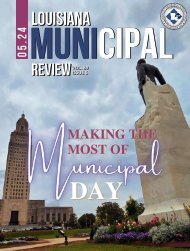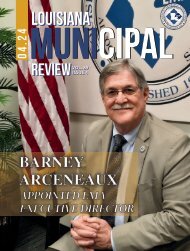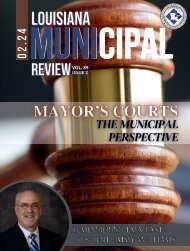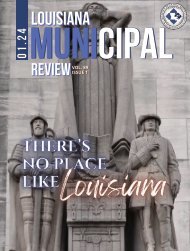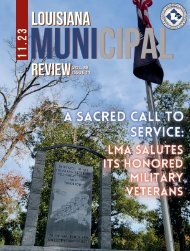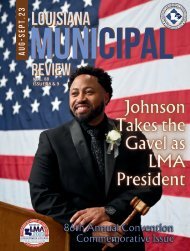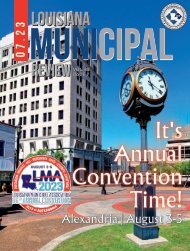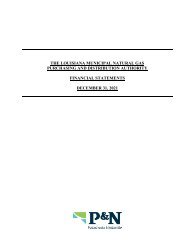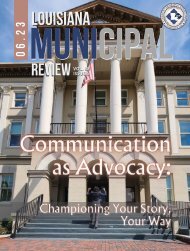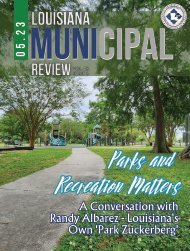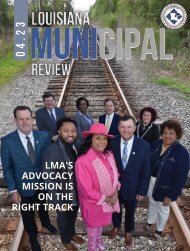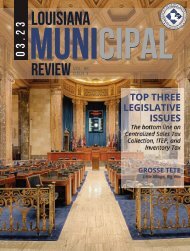LMR JUNE 2021
Create successful ePaper yourself
Turn your PDF publications into a flip-book with our unique Google optimized e-Paper software.
vision of the working group is that the administrative fees
that currently go to the Remote Sellers Commission for their
collection of internet sales taxes (from both the state and locals)
will continue and will become the funding mechanism for the
Commission. On average, the Remote Sellers Commission
has collected $30 million in internet taxes per month, and
they collect a 1% fee. If that funding source is confirmed via
statutory enactment, the new Commission would have an
annual operating budget of $3.6 million.
We have referenced above both the Louisiana Uniform Local
Sales Tax Board (LULST) and the Louisiana Sales and Use Tax
Commission for Remote Sellers (RSC), two existing boards
that are successfully performing their respective functions
within our current sales tax system. So, what happens to them
if this constitutional amendment passes and the legislature
enacts the statutory component by 2/3 vote? Both boards
will be rolled-up into this new Commission. One year
following the first meeting of the Commission, both boards
shall be abolished, and all of their powers, duties, functions,
and responsibilities shall be assumed by the Commission,
along with their outstanding work products. A few examples
of existing tools and programs that will be inherited by the
Commission include the technology that feeds the existing
Parish E-file site (which has collected nearly $25 billion in
sales taxes via its online portal to-date); the taxpayer matrix
developed by locals for the RSC; the voluntary disclosure
agreement protocols developed by the LULST, which has
brought in an additional $13 million in unreported tax
revenue to local government coffers in just a few months; and
the newest innovation of the LULST, the tax rate lookup tool,
which provides exact rates and exemptions by address (either
through individual or bulk inquiries).
Pros and Cons
Though Parish E-file currently enables taxpayers to file and
remit sales taxes online for the state and all 64 parishes, it
does not enable a single payment for all taxes due. This
proposed constitutional amendment gives the Commission
the standing to accept one single payment, which technology
will break out on the back end to send to the proper collectors.
The proposed Commission would also give the appearance
that Louisiana has simplified its sales tax system, which might
be attractive to some businesses seeking to locate here. Does
it actually simplify the system? No. Proponents also assert
that HB 199 would make Louisiana “Wayfair-compliant.” While
it may be said that the Commission would make us slightly
more compliant, it falls short of creating the system envisioned
by the U.S. Supreme Court in South Dakota v. Wayfair, Inc.
The Commission would represent an historic and foundational
change in sales tax collection, and some question, “What
will be gained by this sea change?” There are currently over
200 tax exemptions and exclusions scattered in our law and
constitution: some are mandatory for local governments,
some optional; some only apply to the state, some only to
local governments. Louisiana has the most convoluted sales
tax systems in the country (and our exemptions cost local
governments over $1.3 billion in lost tax revenue per year).
HB 199 will not simplify our system. The Tax Foundation,
who vocally supports HB 199, even admitted under oath that
centralizing sales tax collection will not improve our national
score/ranking whatsoever.
Similarly, HB 199 does not achieve Wayfair compliance. In
finding South Dakota’s tax scheme to be constitutional,
SCOTUS relied heavily on the fact that the state had adopted
the Streamlined Sales and Use Tax Agreement (or SSUTA). One
of the core demands of the SSUTA is that the state must have
uniform state and local tax bases, along with simplified rates.
Louisiana has not adopted the SSUTA because our complex
system of exemptions and exclusions makes that impossible.
Without a statutory framework to accompany HB 199, many
question how it will all work and whether the Commission
would lay the groundwork for a direction in auditing that is
undesirable for locals.
But now, it’s up to you. Whether you ultimately support or
oppose what HB 199 proposes, we encourage you to speak to
your local collectors and to your local businesses, to learn as
much as you can about this unprecedented legislation, and to
vote on October 9, 2021.
LMA 2021 District Meetings
LMA is headed to a district meeting near you! For the first time since
2019, our officers and staff will be on the road in June for district
meetings.
These annual meetings allow the LMA membership to re-elect or
elect their representatives, in the form of District Vice Presidents, who
will sit on the LMA Executive Board for the upcoming year. These
meetings also serve as an opportunity to network with legislators and
state dignitaries, as they are also invited to attend.
Visit the LMA website at www.lma.org > Events to view the full
schedule or to find the meeting in your district.
Page 6
LMR | JUNE 2021



